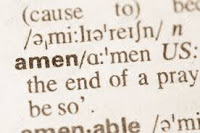
Words are the building blocks of a language. When we study words, we hardly venture to think about its origin. Many words of any particular language have been adopted from other languages due to difficulty in translation or for convenience. One such word is ‘Amen’, which is present in many Western languages. However, its use and meaning are almost the same in all languages that use it.
The word ‘Amen’ is as common as ‘I’ or ‘you’ among Christians, Muslims and Jews. Amen came to English from Latin, to where it came from Greek, while the Greek language got it from Hebrew or Aramaic. The word has also expanded its presence to other romance languages and Arabic.
The word ‘Amen’ doesn’t have an exact meaning in English. It is basically an expression and changes meaning depending on the context. Amen actually first appeared in the early texts of Judaism. It appears as a word for affirmation or declaration in the Hebrew Bible as well as the New Testament. There are numerous theories and speculations regarding its Hebrew origin. The word is related to the Hebrew verb ‘aman’, which means to be confirmed, be faithful or be supported. The Hebrew words for faith and truth, ‘emuna’ and ‘emet’, are also believed to be related to the word ‘amen’.
There are other interesting beliefs as well. Some believe the word came from the Egyptian god Amun while a few oriental thinkers argue that the word was derived from the Sanskrit word ‘Aum’. However, these theories do not hold enough strength among the linguists to be taken too seriously.
Whatever its history is, ‘Amen’ has a significant place in the three major religions in the world. In Christianity, this word is the ending note for every prayer and hymn. It appears a number of times in the Bible.
Jesus has used ‘amen’ a few times to emphasize his words. Contrary to other places, he used it at the beginning of his sentences. Even before that, Jews had been using the word as a conclusion of prayer. With the evolution of community prayers and synagogues and churches, the use of amen became widespread. Amen is also used by Muslims, in its Arabic version, ‘amin’, at the end of dua (supplication) and as an agreement to someone else’s prayer. For instance, someone might say that they hope it will stop raining that day, and the other person will say ‘Amin’ or ‘Ameen’ as a way of responding and agreeing.
In modern times, ‘amen’ is used to express strong agreement to a thought or opinion. People often say ‘amen to that’ in this context. If you ask an Orthodox believer though, he will tell you not to utter the word unless you have absolute conviction.
Related Posts:
